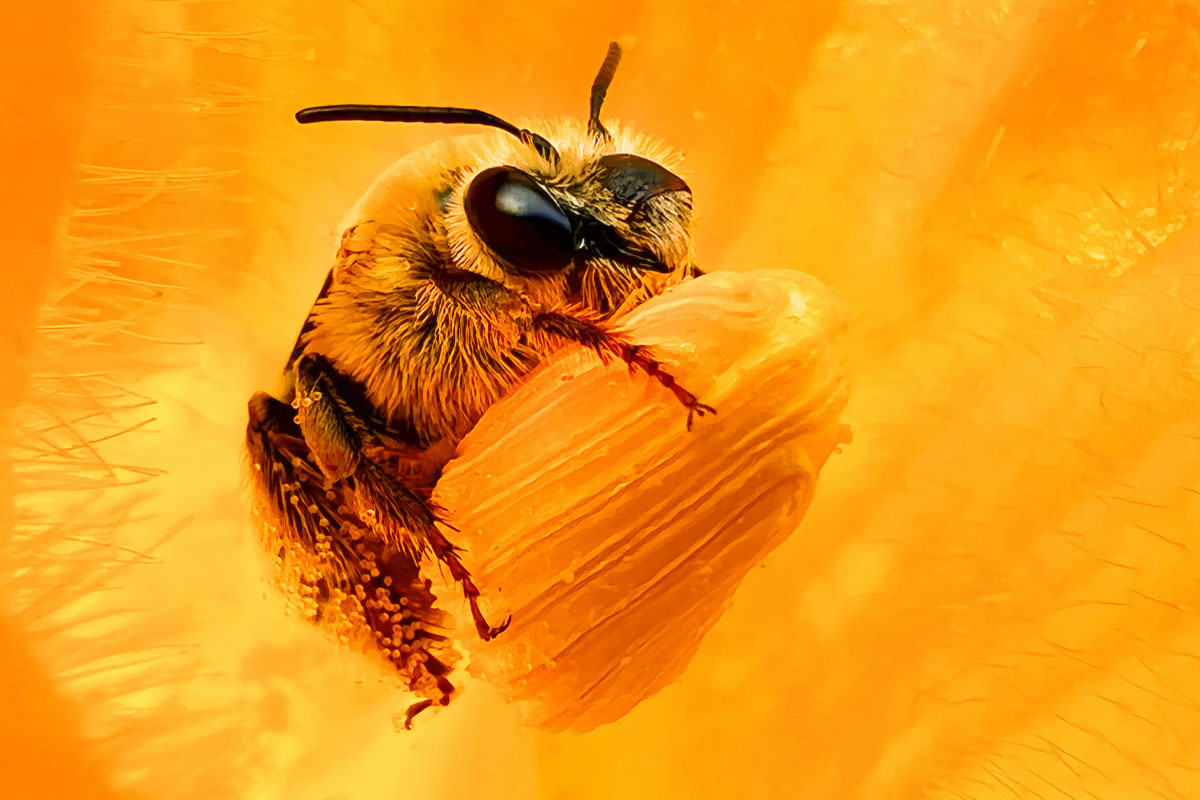HEADTURNED Articles
The Unsung Heroes: Bees and Their Crucial Role in Nature
The World of Bees
Bees: Guardians of Biodiversity
Introduction
Bees are extraordinary creatures that play an indispensable role in sustaining ecosystems and human agriculture. From the Arctic tundra to tropical rainforests, these industrious insects thrive in a variety of habitats and climates. Yet, their populations are under threat due to human activity. This post explores the world of bees, their ecological importance, the challenges they face, and how we can work to protect them.

Bees: Guardians of Biodiversity
A Diverse World: Types and Habitats of Bees
Bees belong to the superfamily Apoidea and include over 20,000 known species worldwide. They can be broadly classified into solitary bees and social bees. These species have evolved to adapt to an incredible range of environments, reflecting their resilience and ecological importance.
- Honeybees (Apis mellifera): Found globally, honeybees thrive in managed hives and wild habitats such as hollow trees. Their ability to form large colonies makes them pivotal in agricultural pollination.
- Bumblebees (Bombus spp.): These fuzzy pollinators are well-suited to cooler climates, often nesting in underground burrows or dense vegetation. They are vital for crops like tomatoes and blueberries due to their buzz pollination technique.
- Carpenter Bees (Xylocopa spp.): Known for drilling into wood to create nests, they inhabit temperate and tropical regions. Despite their solitary nature, they are crucial for pollinating flowering plants.
- Leafcutter Bees (Megachile spp.): Found worldwide, these bees use cut leaves to line their nests, often in hollow stems or cavities. They are exceptional pollinators for alfalfa and other legumes.
- Stingless Bees (Meliponini): Indigenous to tropical areas like South America, Africa, and Southeast Asia, stingless bees are valued not only for their pollination but also for their medicinal honey.
Each region hosts unique species. In North America, sweat bees and squash bees contribute significantly to pollination, while Europe's landscapes are enriched by bumblebees. Australia boasts the blue-banded bee, a vital pollinator for native flora, and Africa's tropical zones are a haven for stingless bees. Favoured habitats range from flower-rich meadows and forests to urban gardens and deserts, emphasising the importance of preserving diverse environments to sustain these species.
Bees: Guardians of Biodiversity
A Grim Reality: Declining Bee Populations
Over the past five decades, the global bee population has faced a steady decline, a phenomenon with severe implications for ecosystems and agriculture. The main drivers of this crisis include:
- Pesticides: Neonicotinoids, widely used in agriculture, impair bee navigation and immune systems. These chemicals, present in plants' nectar and pollen, persist in the environment, impacting entire colonies.
- Habitat Loss: Expanding urban areas and intensive farming practices have drastically reduced natural habitats, fragmenting the ecosystems bees depend on for food and shelter.
- Climate Change: Rising temperatures and erratic weather patterns have disrupted flowering cycles, reducing the availability of nectar and pollen at critical times.
- Diseases and Parasites: Pathogens like Nosema and parasites such as Varroa mites continue to devastate colonies worldwide, often exacerbated by weakened immunity due to other stressors.
“The Intergovernmental Science-Policy Platform on Biodiversity and Ecosystem Services (IPBES) reports that nearly 40% of insect pollinators, including bees, are at risk of extinction. In Europe, bumblebee populations have decreased significantly, with one-third of species facing extinction risks. In the United States, wild bee populations fell by an alarming 23% between 2008 and 2013, as documented by the National Academy of Sciences. The urgency to address these declines cannot be overstated.”

Bees: Guardians of Biodiversity
Honey: A Sweet Necessity
- Human Use: Honey has been cherished for centuries for its nutritional and medicinal properties. Rich in antioxidants and antibacterial compounds, it is used in traditional medicine and modern skincare.
- Indigenous Practices: Communities like the Hadza of Tanzania and the Gurung people of Nepal have long relied on honey for sustenance and income. These practices often involve sustainable harvesting methods, maintaining a balance with nature.
- Other Species: Honey serves as a food source for various animals, including bears, honey badgers, and certain bird species. Additionally, beeswax by-products support other insects in their ecosystems.
Beyond its uses, honey production underscores the importance of healthy bee populations. The continued decline of these pollinators jeopardises not only this resource but also the ecosystems they sustain.
Bees: Guardians of Biodiversity
Revitalising Bee Populations
Efforts to restore and support bee populations are crucial for safeguarding biodiversity and agriculture. Both individual actions and systemic changes are needed to address the challenges bees face.
Small-Scale Initiatives
- Gardens: Planting native wildflowers and creating pollinator-friendly gardens provide essential food sources and habitats.
- Pesticide-Free Practices: Avoiding harmful chemicals helps protect bees from toxins that weaken colonies.
- Bee Hotels: Offering safe nesting sites for solitary bees can significantly boost local populations.
Large-Scale Initiatives
- Wildflower Corridors: Connecting fragmented habitats allows bees to forage and migrate more effectively.
- Regenerative Agriculture: Farming practices that prioritise soil health and biodiversity benefit bees and other pollinators.
- Public Education: Raising awareness about the importance of bees encourages widespread participation in conservation efforts.
Policy and Advocacy
Governments and organisations play a vital role by:
- Enforcing stricter regulations on pesticide use.
- Funding research into pollinator health, such as the HEADTURNED Foundation's Innovation Hub.
- Supporting initiatives that integrate pollinator conservation into urban planning and agricultural policies.
Bees: Guardians of Biodiversity
Beekeeping: Helping or Hurting Bees?
Beekeeping is often seen as a way to support bee populations, but is it truly beneficial? While it can create opportunities to protect honeybee colonies, there are concerns regarding the ethics of harvesting honey and its impact on the bees themselves. Over-harvesting can deprive colonies of their primary food source, leading to stress and reduced resilience. However, when practised responsibly, beekeeping can coexist with healthy hive dynamics. Using sustainable methods, such as leaving adequate honey stores and avoiding excessive hive interventions, ensures that the needs of the bees are prioritised.
On the other hand, beekeeping offers a range of ecological benefits. By establishing hives, beekeepers create thriving local habitats that encourage natural pollination. These habitats often act as catalysts, inspiring neighbouring households to cultivate bee-friendly plants, from wildflowers to shrubs, in gardens and even on balconies. This collective effort not only supports honeybees but also bolsters populations of other wild pollinators that depend on diverse floral resources for survival.
Each beehive contributes to regenerating the bee population. Managed hives can act as reservoirs, stabilising local bee numbers and facilitating pollination networks. When placed in parks, woods, or near forests, these hives integrate with the surrounding ecosystem, enhancing biodiversity. Everyone can play a role in this regeneration. Home gardeners can plant nectar-rich flowers, while communities can advocate for pollinator-friendly urban landscapes. Together, these efforts form a mosaic of safe havens that allow bees to thrive and multiply, creating a hopeful path toward reversing their decline.
Bees: Guardians of Biodiversity
Call to Action: Protecting Our Pollinators
The fate of bees is in our hands, and every small step makes a difference. Whether you are planting a single flower pot, setting up a bee hotel, or advocating for pesticide-free policies in your community, your actions contribute to the survival of these vital pollinators. Support local beekeepers who prioritise sustainable practices and consider planting native wildflowers to create a haven for bees and other pollinators.
Together, we can ensure a thriving future for bees and the ecosystems that depend on them. Let's create a world where bees can flourish—because when they thrive, so do we.